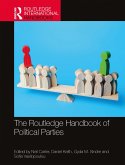During the so-called `golden age' of the party system, which lasted for a few decades from the middle of the twentieth century, parties could successfully mobilize broad and well-defined social interests with strong collective identities. Now, other conditions apply that have dramatically changed the role of parties in the democratic process. Parties have gone from being member-based popular movements to becoming professionalized voter-orientated campaign machines. Short-sightedness and a focus on median voters mean that the established parties have become increasingly similar, and populist parties have had great success in recent decades as a consequence.
This volume, aimed at political scientists and those interested in discussion and analysis of Swedish political party dynamics, focuses on political parties in Sweden, how they have changed and what the changes mean in a wider sense.
Dieser Download kann aus rechtlichen Gründen nur mit Rechnungsadresse in A, B, BG, CY, CZ, D, DK, EW, E, FIN, F, GR, HR, H, IRL, I, LT, L, LR, M, NL, PL, P, R, S, SLO, SK ausgeliefert werden.









